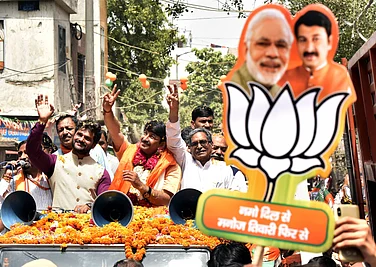On 6 December 1992, in the presence of BJP leader L.K. Advani, Hindu activists demolished the Babri Masjid, a mosque structure imposed on the site in forcible replacement of a Hindu temple during the era of Muslim occupation. Only days after the event, an investigative commission led by Justice M.S. Liberhan was mandated to inquire into the facts and causes of the demolition. Seventeen years and an astronomical budget later, the Liberhan report was first leaked to the press and then finally presented in the Lok Sabha. It is hopelessly shoddy and biased, but its malicious conclusion that the BJP leadership engineered the demolition, though false, is paradoxically quite fair and fitting.
The Liberhan Commission's reported finding that the Bharaitya Janata Party leadership is guilty of the "criminal" demolition of the Babri Masjid, has provoked some protests and denials in BJP and pro-BJP circles. These implicitly assume that the demolition was indeed a crime, that Advani & co have to be absolved from it, and that the guilt must be shifted to Congress Prime Ministers Rajiv Gandhi (r.1984-89) and Narasimha Rao (r.1991-96). Meanwhile, Kalyan Singh and Uma Bharati, then second-rank BJP leaders, have owned up their responsibility, but they happen to be the leaders who ended up clashing with the BJP. Hindu activists loyal to the Ram temple cause will commend their steadfastness. They will also praise Rajiv Gandhi for starting the process of replacing the usurper Babri structure with a proper Ram temple; and Narasimha Rao for passively helping the demolition by his refusal to intervene. By contrast, the BJP leadership’s denial of responsibility will only earn it their contempt.
To be sure, a more orderly procedure to replace the mosque structure with proper temple architecture would have been preferable. Advani had a point in lamenting the breakdown of RSS discipline that made way for the demolition fervour. But even what actually took place was a lesser evil compared with the continuation of the Babri structure, at least in the real world. For one thing, it saved many lives. Just compare the riot toll in the years preceding the demolition with those in the subsequent years. After the Muslim revenge had run its course with the Mumbai bomb attacks of 12 March 1993 (which set the pattern for later terrorist actions in London, Madrid, Bali, Delhi etc., one of the international offshoots of the Ayodhya affair), all was relatively quiet on the Hindu-Muslim front until 2002. The demolition and its aftermath, shocking though they were, triggered a catharsis that sobered up the marching crowds, both Hindu and Muslim. Imagine what riots would have taken place had the Babri eyesore remained standing, a scandal to Hindus and a prop to Muslim hopes of taking it back. Indeed, the prospect of endless Ayodhya-related riots is probably the unstated reason (apart from putting the BJP on the defensive) why Narasimha Rao allowed the demolition to be completed.
As for the pre-planned nature of the demolition, it has always been obvious. This too the BJP should concede unequivocally. Members of the demolition vanguard have told me about their training and the equipment they had brought. They also mentioned the name of the mastermind of the whole operation; it was not Advani nor A.B. Vajpayee. Which brings us to the most startling fact of the demolition’s aftermath: the total refusal of the Indian media to investigate the details. Collectively, they spurned the scoop of the decade, viz. a cover picture with the caption: “Meet the mastermind of the Ayodhya demolition.” The reason is that they found it more expedient to blame Advani and barred themselves from publishing or indeed finding anything that might disturb this story-line.
Once the vanguard had started its operation on 6 December 1992, the rest of the crowd followed. For them at least, the demolition had indeed not been pre-planned. And this unprepared crowd included the unwilling Advani. He and most BJP leaders (if not all -- I cannot claim completeness for my data) clearly were not in on it, and the Liberhan report offers no proof for their involvement either, only some suppositions about what they “must” have known. Even so, they did bear a political responsibility. Today the BJP says that if Home Minister P. Chidambaram did not personally leak the Liberhan report, he remains politically responsible. That makes sense, but the same principle naturally applies to the BJP leaders’ responsibility for the demolition. They should have owned it up right then, and they can still do so now.
Justice M.S. Liberhan is unconvincing in his unfounded allotment of blame for the demolition's technical preparation to them. But it is petty-minded to make a fuss about this, because their political responsibility is so undeniable. Focusing on the technical whodunit is politically incorrect in that it misrepresents the whole issue as conceived by the pro-temple movement. The crime is not that a usurper structure was demolished, but that the government (egged on by the English media, the CPM, the JNU historians and similar usual suspects) had been thwarting the restoration of a Hindu sacred site to its pilgrim constituency, the Hindus. The right policy would have been to acknowledge and act upon the self-evident principle that a Hindu sacred site should be in Hindu custody and adorned with Hindu architecture. Will the secularists insist on the imposition of a Ram temple on the Kaaba site in Mecca, or on the Temple Mount in Jerusalem? Of course not, and for the same reason there should not be a mosque on a hill that for centuries has been the main site dedicated to Rama.
Some people were ready to act upon this simple and logical insight. When Rajiv Gandhi had the locks on the Babri Masjid opened, he clearly embarked on a policy of accommodating the Hindus in compensation for (and in proportion with) the plentiful Muslim “appeasement” by his own and previous governments. It was a typical instance of the Congress culture with its compromises and horse-trading. Nothing very noble, but with the virtue of pragmatism. That approach would normally have led to a deal, with the Ayodhya site for the Hindu lobby and some sweeteners for the Muslim lobby, of which package the ban on Salman Rushdie’s book The Satanic Verses was an opener. Indeed not quite noble, but it would have saved a lot of lives and political energy. Today the Rama Janmabhumi temple would have become just one among many uneventful Hindu places of pilgrimage. Come to think of it, that option could still be tried by the present Congress government.
But in 1989-92, that option was thwarted by the offensive of Babri ultras, and by this I don’t mean the warriors for Islam but the conformistic intellectuals shrieking and howling that the contentious building was the last bastion of “secularism”, a matter of high principle, of life and death. Under their fierce calls for “hard secularism”, no administrator dared to reduce the controversy to its true and manageable proportions anymore. Not the Congress, not the various left-populist parties, and not the BJP either. They were all paralysed and consequently bought time all while taking sides against the weaker party, the pro-temple movement with its vacillating and politically incompetent leadership.
And this shows us another sense in which the BJP is politically responsible for the demolition and for its erratic implementation by an unguided crowd. They too took the side of the status-quo against the Hindu demands. The Hindutva rank and file defied its leaders because it felt cheated by them. After the 1991 elections, when the BJP rose to the rank of largest opposition party, the Ayodhya demand was ditched, first mentally, then gradually also in practice. The activists felt that the leaders didn't mean business, that they didn't dare to push for the logical next step, viz. physically replacing the mosque structure (already in use for Hindu worship) with temple architecture. It was clear that the leaders had no clue on how to go about it. As it later turned out, in 1998-2004, even with the mosque gone and the BJP in power, Advani & co didn't move a finger towards the construction of the temple. So the ordinary activists had rightly sensed the unwillingness of the leaders to take the movement forward. That is why they took the law into their own hands.
The leaders could have avoided this outcome by charting a political roadmap towards a negotiated temple construction and then staying the course. Instead they tried to give the issue a quiet burial all while still making some increasingly faint pro-temple noises in order to retain their vote-bank. For that hypocrisy, they ought to pay a price. The Liberhan findings are shoddy and biased, but the disgrace now suffered by the BJP leaders and worsened by their denials is well-deserved.
Koenraad Elst, a Belgian Indologist, is the author, inter alia of Ayodhya : The Case Against the Temple and Ayodhya, The Finale
























